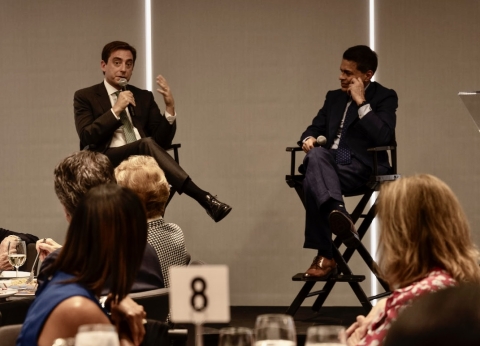
A strange moment of consensus exists in Washington today that China is becoming “the dominant fact in our windscreen” and “a kind of inevitable enemy,” said The New Yorker’s Evan Osnos, in conversation Tuesday with CNN’s Fareed Zakaria.
“And any time there’s too much consensus, I get an eerie feeling,” Osnos said.
The conversation between Osnos and Zakaria was part of an evening organized by the International Center for Journalists (ICFJ) at The New York Times. With growing tensions between the U.S. and China, the two journalists discussed how China has changed over the last two decades and where it is headed.
In the Biden administration, few people who run U.S. policy on China speak Chinese or have visited the country extensively, Zakaria said. The leading Republican voice on China, Mike Gallagher (R-WI), has never visited China, he said.
“This is where, again, I think the power of journalism, the power of reporting, the power of putting things in context becomes so important,” Zakaria said. “Because think about what Evan has been telling us, the picture he's been painting. It’s a complicated one. China has its strengths, but it has its weaknesses.”
China has one formal security alliance: “It’s with North Korea, and they don’t even like each other,” Osnos said. The U.S., meanwhile, has 59 treaty allies. China has one foreign base, in Djibouti. The U.S. has 800 worldwide. These numbers put in perspective “the question of, ‘Do we really need to be running so scared?’” Zakaria said.
“That is part of the point of journalism, to help clarify these issues, provide more facts, give us a sense of calm and confidence and assurance,” he said, “because one of my views about American foreign policy is whenever we get scared, we do really stupid things.”
China recognizes its isolation and is trying to determine how to build more durable relationships, Osnos said. The “elephant in the room” is that the Communist Party of China has not wanted to forge the reciprocal security relationships that are core to U.S. security and leadership, he said.
“China right now is going around Asia and is trying to say to people, ‘Look, fundamentally, you need us economically. We will be here when the United States is not,’” Osnos said. “Your neighbor says to you, ‘We will be here after your friends leave’ – that doesn't sound all that nice.”
Rejection of the West
Osnos recalled a different time, when China was opening up to the world. Around the 2008 Summer Olympics in Beijing, Osnos wrote for The New Yorker about a “fanatical interest” in the English language. Today, English has been removed from subway signs and the tutoring industry was done away with almost overnight.
“There is a widespread belief in senior leadership of the Chinese Communist Party that they went too far down the road in embracing these kinds of Western elements,” Osnos said.
At one point Osnos spoke to a group of students at the Global Business Journalism Program at Tshingua University in Beijing, an elite master’s program that is a partnership between ICFJ, the university and Bloomberg News. They “were just crackling with investigative intensity and ambition.”
“A lot of them ended up working initially for Western news organizations as news assistants, things like that, and then they would go on to become powerhouses in Chinese media,” he said. “It was just an extraordinarily exciting time to watch what the Chinese media was capable of.”
It isn’t surprising that China has tightened its grip on its citizens, said Zakaria, because that’s what happens in dictatorships when they open up their economies.
"What I think we all got wrong was the efficiency, effectiveness and brutality, the quiet brutality, with which the Chinese regime, the Communist Party, was able to completely change course,” said Zakaria.
U.S. Resilience
Today, Xi believes he is seeing the natural restoration of the East’s dominance, Osnos said. He will sometimes say, “We are living through changes unseen in a century,” which is a coded way of saying an entire democratic system of norms is declining. The financial crisis, storming of the U.S. Capitol and the election of President Trump are all “evidence.”
But what is difficult for Xi and his cohort to understand about the United States system is its rapid cycle of resilience, Osnos said. Unlike China, there is an opportunity for a do-over every four years that requires a reassessment of first principles, he said.
Despite the rapid changes in China today, the people in China who wanted to report the truth and shine a light on inequality remain. Don’t forget that China, Zakaria said.
“Those people are still around and, more importantly, that spirit is probably still around,” Zakaria said. “They're all terrified to say anything. But I think we know about these things, that they don't die forever.”
In addition to the conversation on China-U.S. relations, ICFJ recognized ICFJ Board Directors Jim Hoge and Pamela Howard at the May 23 event. Learn more about ICFJ’s inaugural Jim Hoge Reporting Fellows, from Brazil, Nigeria and Syria, and the Pamela Howard Forum on Global Crisis Reporting.